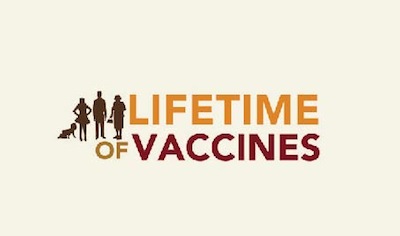Merck’s investment in motherhood has taken two forms this fall—recruiting actress Melissa Joan Hart to launch the “Once Upon a Birth” campaign to raise awareness about maternal mortality in the US, and launching “Lifetime of Vaccines,” a pilot program in Cincinnati, Chicago and Sacramento that focuses on educating women about the importance of vaccines for their children, their partners and themselves.
The “Lifetime” campaign, which launched earlier this month, is a partnership between Merck and the nonprofit HealthyWomen, and is being promoted in the three target cities using email, TV, radio and print. The effort also includes an informational section housed on WebMD that bears the Merck logo and walks readers through the history of vaccines, as well as providing risk and benefit information, and links to CDC vaccination schedules.
HealthyWomen’s CEO Elizabeth Battaglino told MM&M her readership includes women in their mid-20s through the over-70s. The pilot program, which will run between six and 12 months, may be expanded.
Merck’s global communications lead for vaccines, Imraan Munshi, said the HealthyWomen-Merck campaign is also a unique messaging opportunity. “Typically when you have these kinds of unbranded campaigns, they focus on a specific disease area. [In this case] we have the opportunity to talk about vaccines across diseases, across ages,” he told MM&M.
Although the print materials tout vaccine’s protective benefits, the site also includes questions parents can ask their doctors, such as “I’m an adult, which vaccines are recommended for me,” and “which vaccines are recommended for my pre-teen or teen.”
These questions touch on a sore point noted in the CDC’s vaccines information, which points out that the number of adults vaccinated against influenza is well below the 2010 goal. The catch: the CDC also notes that while HCPs and professional organizations are essential to driving up numbers, at last count (in 1994), doctors overestimated how often they recommended adult patients get vaccinated against influenza or pneumonia. Merck markets the pneumococcal vaccine Pneumovax 23, in addition to the shingles vaccine Zostavax, and the HPV vaccine Gardasil, among others.
“Fifty-eight percent of American adults are not seeking any kind of vaccination, and we want the public and the target audience to understand that vaccination is not just for kids, it’s beyond that,” Munshi said.
“We can’t just rely on healthcare providers to remind and discuss every aspect of our health,” Battaglino said.
The “Once Upon a Birth” campaign, which also launched this month, is an extension of the Merck for Mothers program the company launched last year. The goal of the larger initiative is to drive down the number of women who die during pregnancy and childbirth worldwide, through efforts that include sex education, professional education training and designing scalable strategies that address local needs and challenges. The Once Upon a Birth component links the campaign’s goal to increase awareness of the problem—the World Health Organization says a woman dies during pregnancy or delivery every two minutes—and action, by donating to a social change initiative headed up by the CARE humanitarian group every time a woman shares her birth story on the Merck for Mothers Facebook page.
The campaign’s awareness push is not strictly limited to international concerns: Merck pointed out in a statement that 46% of the adults polled in a company-driven survey did not know that maternal death is an issue in the United States.
Spokeswoman Hart was among those who were not aware of the scope of the problem. “I was lucky to have had three healthy pregnancies and deliveries with great medical care. I now know that this is not always the case, even for women here in the US,” she said in a statement.
“I was surprised and saddened to learn that, despite medical advancements, each day 800 women around the world die during pregnancy or childbirth,” she added.
An entry in the site’s “Notes from the Field,” section by Merck’s EVP and chief medical officer, Michael Rosenblatt reinforces the reasons why the company is urging domestic awareness and global empathy. “The United States is among the few countries where the rate of women dying during pregnancy and childbirth is rising instead of falling,” he wrote, in addition to noting that women in the US “have a higher risk of dying of pregnancy-related complications than women in 49 other countries.”
Merck’s poll also indicated that most US adults didn’t know that post-partum bleeding and preeclampsia were leading causes of maternal death and that 81% were “outraged” to hear that these deaths could be prevented.
The US Facebook page has racked up more than 5,000 Likes since its October launch, in addition to around 70 birth stories.








